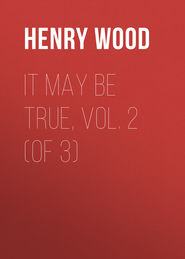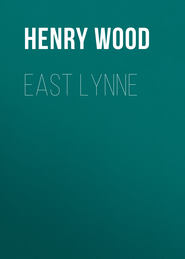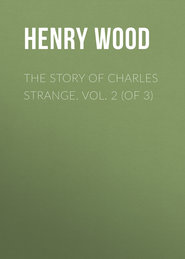По всем вопросам обращайтесь на: info@litportal.ru
(©) 2003-2024.
✖
Elster's Folly
Настройки чтения
Размер шрифта
Высота строк
Поля
"But what grounds were there for supposing that he—that he—I think you must be mistaken, Mrs. Capper. Lord Hartledon, I am sure, knows nothing of this suspicion."
"I never heard nothing about grounds, sir," simply replied the woman. "I suppose folks fastened it on him because he's a loose character: and his face is all covered with hair, like a howl."
He almost laughed again as he turned away, dismissing the suspicion she had hinted at as unworthy a moment's credit. The broad gravel-walk through this portion of the park was very short, and the large grey-stone house was soon reached. Not to the stately front entrance did he bend his steps, but to a small side entrance, which he found open. Pursuing his way down sundry passages, he came to what used to be called the "west kitchen;" and there sat three women at breakfast.
"Well, Mirrable! I thought I should find you up."
The two servants seated opposite stared with open mouths; neither knew him: the one he had addressed as Mirrable turned at the salutation, screamed, and dropped the teapot. She was a thin, active woman, of forty years, with dark eyes, a bunch of black drooping ringlets between her cap and her thin cheeks, a ready tongue and a pleasant manner. Mirrable had been upper maid at Hartledon for years and years, and was privileged.
"Mr. Percival! Is it your ghost, sir?"
"I think it's myself, Mirrable."
"My goodness! But, sir, how did you get here?"
"You may well ask. I ought to have been here last night, but got out at some obscure junction to obtain a light for my cigar, and the train went on without me. I sat on a bench for a few hours, and came on by the goods train this morning."
Mirrable awoke from her astonishment, sent the two girls flying, one here, one there, to prepare rooms for Mr. Elster, and busied herself arranging the best breakfast she could extemporise. Val Elster sat on a table whilst he talked to her. In the old days, he and his brothers, little fellows, had used to carry their troubles to Mirrable; and he was just as much at home with her now as he would have been with his mother.
"Did Capper see you as you came by, sir? Wouldn't she be struck!"
"Nearly into stone," he laughed.
Mirrable disappeared for a minute or two, and came back with a silver coffee-pot in her hand. The name of the lodge-keeper had brought to his remembrance the unpleasant hint she mentioned, and he spoke of it impulsively—as he did most things.
"Mirrable, what man is it they call Pike, who has taken possession of that old shed?"
"I'm sure I don't know, sir," answered Mirrable, after a pause, which Mr. Elster thought was involuntary; for she was busy at the moment rubbing the coffee-pot with some wash-leather, her head and face bent over it, as she stood with her back to him. He slipped off the table, and went up to her.
"I saw smoke rising from the shed, and asked Capper what it meant, and she told me about this man Pike. Pike! It's a curious name."
Mirrable rubbed away, never answering.
"Capper said he had been suspected of firing the shot that killed my brother," he continued, in low tones. "Did you ever hear of such a hint, Mirrable?"
Mirrable darted off to the fireplace, and began stirring the milk lest it should boil over. Her face was almost buried in the saucepan, or Mr. Elster might have seen the sudden change that came over it; the thin cheeks that had flushed crimson, and now were deadly white. Lifting the saucepan on to the hob, she turned to Mr. Elster.
"Don't you believe any such nonsense, sir," she said, in tones of strange emphasis. "It was no more Pike than it was me. The man keeps himself to himself, and troubles nobody; and for that very reason idle folk carp at him, like the mischief-making idiots they are!"
"I thought there was nothing in it," remarked Mr. Elster.
"I'm sure there isn't," said Mirrable, conclusively. "Would you like some broiled ham, sir?"
"I should like anything good and substantial, for I'm as hungry as a hunter. But, Mirrable, you don't ask what has brought me here so suddenly."
The tone was significant, and Mirrable looked at him. There was a spice of mischief in his laughing blue eyes.
"I come on a mission to you; an avant-courier from his lordship, to charge you to have all things in readiness. To-morrow you will receive a houseful of company; more than Hartledon will hold."
Mirrable looked aghast. "It is one of your jokes, Mr. Val!"
"Indeed, it is the truth. My brother will be down with a trainful; and desires that everything shall be ready for their reception."
"My patience!" gasped Mirrable. "And the servants, sir?"
"Most of them will be here to-night. The Countess-Dowager of Kirton is coming as Hartledon's mistress for the time being."
"Oh!" said Mirrable, who had once had the honour of seeing the Countess-Dowager of Kirton. And the monosyllable was so significant that Val Elster drew down the corners of his mouth.
"I don't like the Countess-Dowager, sir," remarked Mirrable in her freedom.
"I can't bear her," returned Val Elster.
CHAPTER II.
WILLY GUM
Had Percival Elster lingered ever so short a time near the clerk's house that morning he would have met that functionary himself; for in less than a minute after he had passed out of sight Jabez Gum's door opened, and Jabez Gum glided out of it.
It is a term chiefly applied to ghosts; but Mr. Gum was a great deal more like a ghost than like a man. He was remarkably tall and thin; a very shadow; with a white shadow of a face, and a nose that might have served as a model for a mask in a carnival of guys. A sharp nose, twice the length and half the breadth of any ordinary nose—a very ferret of a nose; its sharp tip standing straight out into the air. People said, with such a nose Mr. Gum ought to have a great deal of curiosity. And they were right; he had a great deal in a quiet way.
A most respectable man was Mr. Gum, and he prided himself upon it. Mr. Gum—more often called Clerk Gum in the village—had never done a wrong thing in his life, or fallen into a scrape. He had been altogether a pattern to Calne in general, and to its black sheep in particular. Dr. Ashton himself could not have had less brought against him than Clerk Gum; and it would just have broken Mr. Gum's heart had his good name been tarnished in ever so slight a degree. Perhaps no man living had been born with a larger share of self-esteem than Jabez Gum. Clerk of the parish longer than Dr. Ashton had been its Rector, Jabez Gum had lived at his ease in a pecuniary point of view. It was one of those parishes (I think few of them remain now) where the clerk's emoluments are large. He also held other offices; was an agent for one or two companies, and was looked upon as an exceedingly substantial man for his station in life. Perhaps he was less so than people imagined. The old saying is all too true: "Nobody knows where the shoe pinches but he who wears it."
Jabez Gum had his thorn, as a great many more of us have ours, if the outside world only knew it. And Jabez, at odd moments, when the thorn pierced him very sharply, had been wont to compare his condition to St. Paul's, and to wonder whether the pricks inflicted on that holy man could have bled as his own did. He meant no irreverence when he thought this; neither do I in writing it. We are generally wounded in the most vulnerable spot about us, and Jabez Gum made no exception to the rule. He had been assailed in his cherished respectability, his self-esteem. Assailed and scarred. How broad and deep the scar was Jabez never told the world, which as a rule does not sympathise with such scars, but turns aside in its cruel indifference. The world had almost forgotten the scar now, and supposed Clerk Gum had done the same. It was all over and done with years ago.
Jabez Gum's wife—to whom you will shortly have the honour of an introduction, but she is in her bedroom just now—had borne him one child, and only one. How this boy was loved, how tenderly reared, let Calne tell you. Mrs. Gum had to endure no inconsiderable amount of ridicule at the time from her gossiping friends, who gave Willy sundry endearing names, applied in derision. Certainly, if any mother ever was bound up in a child, Mrs. Gum was in hers. The boy was well brought up. A good education was given him; and at the age of sixteen he went to London and to fortune. The one was looked upon as a natural sequence to the other. Some friend of Jabez Gum's had interested himself to procure the lad's admission into one of the great banks as a junior clerk. He might rise in time to be cashier, manager, even partner; who knew? Who knew indeed? And Clerk Gum congratulated himself, and was more respectable than ever.
Better that Willy Gum had remained at Calne! And yet, and again—who knew? When the propensity for ill-doing exists it is sure to come out, no matter where. There were some people in Calne who could have told Clerk Gum, even then, that Willy, for his age, was tolerably fast and forward. Mrs. Gum had heard of one or two things that had caused her hair to rise on end with horror; ay, and with apprehension; but, foolish mother that she was, not a syllable did she breathe to the clerk; and no one else ventured to tell him.
She talked to Willy with many sighs and tears; implored him to be a good boy and enter on good courses, not on bad ones that would break her heart. Willy, the little scapegrace, was willing to promise anything. He laughed and made light of it; it wasn't his fault if folks told stories about him; she couldn't be so foolish as to give ear to them. London? Oh, he should be all right in London! One or two fellows here were rather fast, there was no denying it; and they drew him with them; they were older than he, and ought to have known better. Once away from Calne, they could have no more influence over him, and he should be all right.
She believed him; putting faith in the plausible words. Oh, what trust can be so pure, and at the same time so foolish, as that placed by a mother in a beloved son! Mrs. Gum had never known but one idol on earth; he who now stood before her, lightly laughing at her fears, making his own tale good. She leaned forward and laid her hands upon his shoulders and kissed him with that impassioned fervour that some mothers could tell of, and whispered that she would trust him wholly.
Mr. Willy extricated himself with as little impatience as he could help: these embraces were not to his taste. And yet the boy did love his mother. She was not at all a wise woman, or a clever one; rather silly, indeed, in many things; but she was fond of him. At this period he was young-looking for his age, slight, and rather undersized, with an exceedingly light complexion, a wishy-washy sort of face with no colour in it, unmeaning light eyes, white eyebrows, and ragged-looking light hair with a tawny shade upon it.
Willy Gum departed for London, and entered on his engagement in the great banking-house of Goldsworthy and Co.
How he went on in it Calne could not get to learn, though it was moderately inquisitive upon the point. His father and mother heard from him occasionally; and once the clerk took a sudden and rather mysterious journey to London, where he stayed for a whole week. Rumour said—I wonder where such rumours first have their rise—that Willy Gum had fallen into some trouble, and the clerk had had to buy him out of it at the cost of a mint of money. The clerk, however, did not confirm this; and one thing was indisputable: Willy retained his place in the banking-house. Some people looked on this fact as a complete refutation of the rumour.
Then came a lull. Nothing was heard of Willy; that is, nothing beyond the reports of Mrs. Gum to her gossips when letters arrived: he was well, and getting on well. It was only the lull that precedes a storm; and a storm indeed burst on quiet Calne. Willy Gum had robbed the bank and disappeared.
In the first dreadful moment, perhaps the only one who did not disbelieve it was Clerk Gum. Other people said there must be some mistake: it could not be. Kind old Lord Hartledon came down in his carriage to the clerk's house—he was too ill to walk—and sat with the clerk and the weeping mother, and said he was sure it could not be so bad as was reported. The next morning saw handbills—great, staring, large-typed handbills—offering a reward for the discovery of William Gum, posted all over Calne.
Once more Clerk Gum went to London. What he did there no one knew. One thing only was certain—he did not find Willy or any trace of him. The defalcation was very nearly eight hundred pounds; and even if Mr. Gum could have refunded that large sum, he might not do so, said Calne, for of course the bank would not compound a felony. He came back looking ten years older; his tall, thin form more shadowy, his nose longer and sharper. Not a soul ventured to say a syllable to him, even of condolence. He told Lord Hartledon and his Rector that no tidings whatever could be gleaned of his unhappy son; the boy had disappeared, and might be dead for all they knew to the contrary.
So the handbills wore themselves out on the walls, serving no purpose, until Lord Hartledon ordered them to be removed; and Mrs. Gum lived in tears, and audibly wished herself dead. She had not seen her boy since he quitted Calne, considerably more than two years before, and he was now nearly nineteen. A few days' holiday had been accorded him by the banking-house each Christmas; but the first Christmas Willy wrote word that he had accepted an invitation to go home with a brother-clerk; the second Christmas he said he could not obtain leave of absence—which Mrs. Gum afterwards found was untrue; so that Willy Gum had not been at Calne since he left it. And whenever his mother thought of him—and that was every hour of the day and night—it was always as the fair, young, light-haired boy, who seemed to her little more than a child.
A year or so of uncertainty, of suspense, of wailing, and then came a letter from Willy, cautiously sent. It was not addressed directly to Mrs. Gum, to whom it was written, but to one of Willy's acquaintances in London, who enclosed it in an envelope and forwarded it on.











